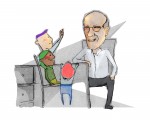During the winter of my junior year, I had the privilege of taking a course titled “Government and Politics of China: China in Age of Reform,” taught by Professor Richard Baum.
Baum, an expert in comparative Chinese politics, passed away last month.
Occasionally, I would attend Baum’s office hours.
The few times I stopped by his office in Bunche Hall opened me to the study of Chinese politics, fostering in me a nascent fascination with the region. I only wish I had taken greater advantage of all he had to offer.
On Dec. 14, 2012, Baum died after a four-and-a-half year struggle with cancer. A memorial was held in honor of him on Jan. 19.
In attendance were scholars of Chinese politics from Stanford University, University of Southern California, various University of California campuses and several of Baum’s former students, including myself.
The ceremony made me realize, too late, how much more I could have learned from Baum.
Baum expressed a similar regret about students and his office hours. On more than one occasion, Baum canceled his hours because so few students visited.
Generally, students spend only a quarter in the company of a single professor.
At UCLA, students are blessed with a litany of world-renowned professors and lecturers.
Yet I invite my peers to ask themselves: How often do you attend professors’ office hours simply to tap into their expertise?
I, like too many of my peers, overlooked one of the most valuable resources available at UCLA.
To say that Baum was an influential man would be a gross understatement. He wrote six scholarly works on China and a memoir of his travels through the country.
He advised two presidents on Sino-U.S. relations and created Chinapol, a listserv that is one of – if not the – greatest forum for academic discussion of contemporary Chinese politics.
As a lecturer, Baum was engaging and inspiring, always ready to recite a quirky Chinese proverb or stories from his world travels.
Outside of class, Baum gave his time generously and jovially.
Each visit I paid to his office enriched my understanding of Chinese affairs.
My first conversation with Baum convinced me of China’s global importance; my second inspired me to pursue further study in Chinese foreign policy after graduation.
Every teacher at UCLA has the potential to open minds and opportunities, if only a student accepts the teaching.
I regret not attending more office hours and picking his mind further. I can’t help but wonder what I might have learned had we conversed for even a few more hours.
When I visited Baum I was consistently the only one in his library-like office. But the same has been true for the office hours of most of my professors.
Such absence is not necessarily conscious. Rather, students do not seem to understand how valuable the knowledge of their professors is. I was equally shortsighted.
At UCLA, we are in the company of Nobel laureates such as economist Lloyd Shapley, public officers such as Michael Dukakis and Pulitzer Prize-winning authors like Jared Diamond.
I am a fool if I do not seize every chance to speak with and learn from these great minds.
Students today have innumerable means of communicating with their professors, making educators more accessible than ever.
Given the prevalence of email and similar communication technologies, greater understanding is at a student’s fingertips, quite literally.
All it takes is a thirst for knowledge and the will to pursue it.
In his will, Baum requested that the Monty Python song “Always Look on the Bright Side of Life” be played at the closing of his memorial, a whimsical yet appropriate choice.
Professor, here is my bright side.
Your final lesson was to open my eyes to the resources at my disposal. From here on, they will be noticed, they will be used.
Email Padgett at hpadgett@media.ucla.edu Send general comments to opinion@media.ucla.edu or tweet us @DBOpinion.

so inspiring. Reaching out is part of our college experience. We will never get the chance to open up to people from different generations the way we do with professors
I had the pleasure of interviewing Richard Baum for a UCLA Today story (http://today.ucla.edu/portal/ut/080422_richard-baum.aspx) before the 2008 Beijing Olympics, and I found him a most interesting, insightful and modest China expert. His premature passing is a reminder to reach out to our professors before it’s too late, starting with the older ones but not ignoring the relatively younger, especially those who might have published books lately, such as UCLA linguist and Chicano/a Studies Center Associate Professor Otto Santa Ana, whose one-of-a-kind book, “Juan in a Hundred: The Representation of Latinos on Network News,” highlights the perils for journalists of ignoring minority groups and offers at least one great tip for TV reporters on how to shoot news videos (http://patch.com/A-1v86).